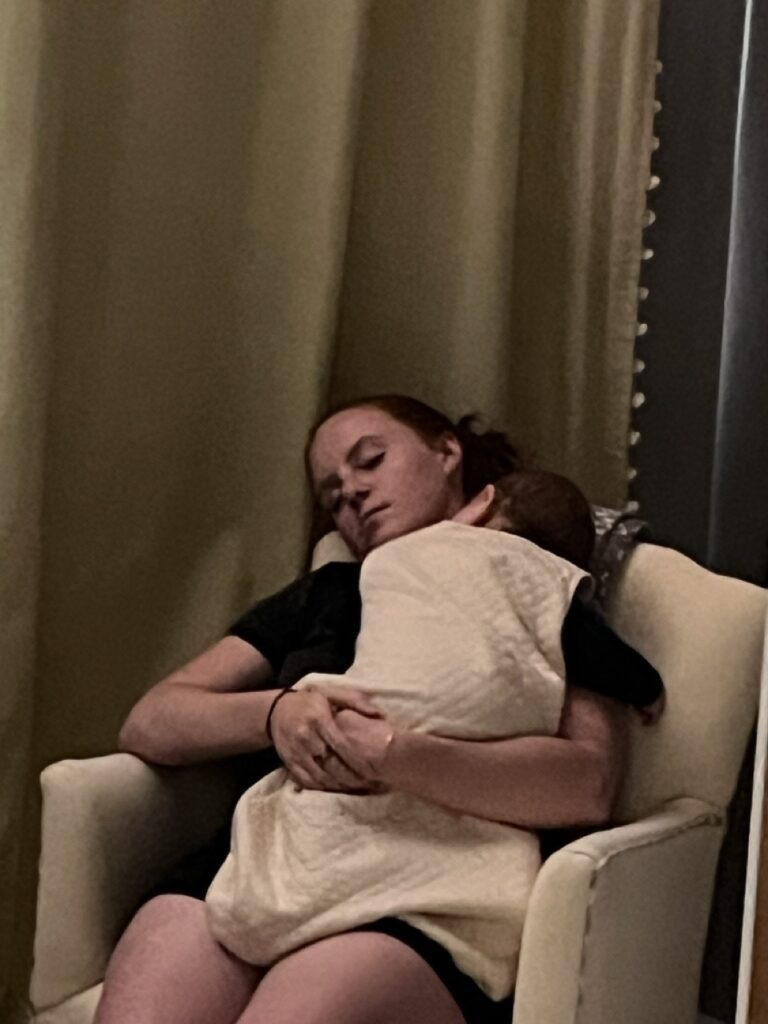A Mother’s Intuition
Full disclosure: I became a mother in 2022, when the “Cry it Out” method, sleep training, and sleep schedules for newborn infants and babies was trending. At the time of writing this, it still is! I propose new moms should question this trend in favor of developing a mother’s intuition. Moms can learn how to listen to their nurturing, motherly instincts with each unique child.
It’s late at night and you finally curl into your bed, get cozy, and close your eyes eager for a little rest when your baby cries.
“You’ve got to be kidding me!”
I’ll admit that I don’t typically spring out of bed with enthusiasm in this situation, but I do get out of bed.
In 2024, for some reason, that seems to be abnormal. It’s not the norm to nurture our children.
“When the Hatch Sound Machine turns green, then you can get out of bed.”
“Just pour a glass of wine, turn the volume up in your headphones, and let them cry until they fall asleep.”
“They’ll adjust eventually!”
These are common threads in the conversations I have had with other mothers about their approach to managing their babies’ sleep.
While I question the approach, I absolutely empathize. It’s irritating beyond belief to feel like you never have enough time to get anything done, you’re exhausted every single day, and they need you again?!

Remember: He is a baby.
In the beginning of our parenting journey, my husband–the most patient person I know outside of taking care of a newborn infant–had the shortest fuse I had ever seen from him. I would remind him often, “Honey, he is a baby. Just remember that.”
Why is it that in today’s convenience-is-king culture, we treat babies like little adults?
I got out of bed and went into Russell’s room. He was congested and, as a thumb-sucker, not being able to breathe out of your nose poses a problem when you’re trying to sleep. I cuddled him, stroked his hair, and unfortunately that wasn’t enough. This was an abnormally challenging night trying to get him to calm down and I couldn’t wish the congestion away, but I also was in zombie mode.
Every bone in my body wanted to put him down in the crib and close the door. I knew his basic needs were all met and the only thing he wanted was me in the room.
Why is it that in today’s convenience-is-king culture, we treat babies like little adults?
But my heart, the one I allow to lead me towards nurturing, motherly instincts, fought back and said “there’s no way you are leaving this room to let your son scream for you just so you can go back into your comfortable bed.”
So I stayed. I grabbed a blanket and fell asleep right next to him to wake up after a short nap to my sweet son peacefully asleep.
We often think of our babies’ basic needs in terms of just a three-step system and ignore a critical fourth.
We consider:
Clean diaper? Check.
Water? Check.
Food? Check.
If he or she isn’t hungry, thirsty, or in a dirty diaper, they can fend for themselves as the little robots that they are and go to sleep.
But that’s where I’d like to say to all of us what I reminded my husband of in the beginning of our journey. They’re just babies.
History of Sleep Training
Trends throughout history show this theory that children do not need to be nurtured is not new. Dr. Benjamin Spock advocated for sleep training in The Common Sense Book of Baby and Child Care first published in 1946. In it, he writes:
“The cure is simple: put the baby to bed at a reasonable hour, say good night affectionately but firmly, walk out of the room, and don’t go back. Most babies who have developed this pattern cry furiously for 20 or 30 minutes the first night, and then when they see that nothing happens, they suddenly fall asleep! The second night the crying is apt to last only 10 minutes. The third night there usually isn’t any at all.”1
The Common Sense Book of Baby and Child Care by Dr. Benjamin Spock
When I was searching for my own True North of how to care for my first newborn child, I kept in the back of my mind an example that, although extreme, illustrates a different perspective from that of Dr. Spock. I knew it was commonplace for orphanages in various parts of the world to be overrun with babies so much so that there were simply not enough nurses to care for their needs. It struck me then to find out that these orphanages are nearly so quiet you could hear a pin drop because these babies have learned that unfortunately, no one will come when they cry.
Even earlier than Dr. Spock was Dr. Luther Emmett Holt’s The Care of Feeding and Children published in 1894. He professed that “[The infant] should simply be allowed to “cry it out.” This often requires an hour, and in extreme cases, two or three hours. A second struggle will seldom last more than ten or fifteen minutes, and a third will rarely be necessary.” Other “professionals” during this time believed that too much nurturing of a baby would yield spoiled “‘little tyrants.’”2
They went completely against encouraging a mother’s intuition and instilled fear that we would somehow mess things up by being nurturing and responding to our children’s needs.
The Fourth Need: Affection
It takes tremendous strength and self sacrifice to put down our own productivity, wants, and desires and say “yes!” to fatigue, delayed gratification, and coming second for the sake of that fourth need: Affection. And this was something I determined to be unwilling to compromise in the care of my son.
We could also call it nurturing, the constant reassurance that love is here and surrounding them, comfort, and an unwavering presence of all of the above.
I believe my children will flourish as a result of my constant reassuring love early on
I believe my children will flourish in their freedoms as young children, teenagers, and eventually adults as a result of my consistently responding to their greatest need for reassuring love and connection. Keeping this up and adapting to shifting needs with age, of course, I believe this will equip them to be more independent, not less.
What do we think goes through a baby’s developing mind when they’re left in their crib to cry? Do they think, “It’s okay, I’m being sleep trained right now!” Or is it a confused fear over why no one seems to answer their call?
We disguise this negligence as parenting and follow Instagram accounts that walk us through all the details of how to get our 3 month old babies to sleep through the night when, in fact, we are often saying “no” to the very best part of parenting: The refinement into a more selfless and serving adult.
It’s hard getting out of bed every time our babies cry, but if the desire to comfort our babies isn’t enough to persuade us to pick them up and comfort them then let’s respond to them for our own personal development. I have learned more about putting others first in the past year and a half than In my entire life due to the countless times my mind and body have wanted to do one thing and my motherly instinct has said otherwise.
Encouraging a Mother’s Intuition
And herein lies the perspective missing with these “experts” advocating through the years for ignoring a baby’s nighttime cries: Intuition
A perspective opposed to the Cry it Out Method comes from Dr. Sears, well known for his books on various topics like vaccinations for children and sleep. He writes directed toward parents:
“You cease to value your own biological cues, your judgment and instead follow the message of someone who has no biological attachment, nor investment, in your infant.”3
Dr. Bob Sears
He also argues that it is critical to learn, as a parent, your child’s different cries, cues, and emotions to decipher when something may actually be wrong (perhaps a digestive issue or underlying health condition that is causing frequent wake-ups) and develop a routine that works for your unique child. In other words, Dr. Sears is in favor of and encouraging the use of a mother’s intuition with her children.
It is common for new parents to mostly be surrounded by other new parents. Mothers with babies and toddlers of the same ages are often on the same nap schedules as, as a result, find themselves at the library story time that most closely matches children of similar ages. Because of this, there is little wisdom in the sense of hindsight bias from a mother who has, for example, had years to reflect on her “sleep training” decisions.
A Small Case Study
There was more than one difficult night when I reminded my husband of one such conversation he was able to have right before my son was born. A friend of his was years ahead of us with children knee-deep in sports and school activities, but this dad was not so far from the newborn stage that he did not remember a small regret. He shared with my husband how he wished he and his wife had not sleep trained their oldest. Compared to the other children (who were responded to throughout the night and not left to cry), the child who had been sleep trained as an infant was far less independent and more clingy now as a young boy. Although just one example, his parents could not help but wonder if his clingy demeanor was a result of their not responding to his cries as an infant.
I clung to this long-view perspective as I responded to my son night after long and tired night, and as I leaned more on my “mother’s intuition” than the biggest trend on social media for getting babies to sleep. My hope was and is that a foundation of safety, nurturing care, and constant reassurance would lend itself to giving him a long leash from which to curiously and confidently explore his world as he grows up.
It’s a struggle, but it’s so very worth it.
Already one and a half years in and my son is already exhibiting tendencies of independence and fearlessness as he conscientiously wanders farther away from me than many children his age to explore his surroundings. He always checks that I’m watching him, but, with that feeling of security, keeps exploring.
I have sorted through this matter, and I challenge you to consider it also. No matter where you are as a mother, if your child is still in a baby bed, you might reevaluate your position on how to respond to middle-of-the-night cries. Should you throw in the towel on sleep training? Does your focus need to shift from yourself to Baby? Use your God-given mother’s intuition and you will learn how to gauge what cries merit which response.
It’s a struggle, but it’s so very worth it.
P.s. If you, like I was for a long time, are struggling to believe you could have a mother’s intuition, I would encourage you to revisit your purpose. Confidence comes with practice!
- https://intuitiveparentingdc.com/blog/history-of-sleep-training ↩︎
- https://intuitiveparentingdc.com/blog/history-of-sleep-training ↩︎
- https://www.askdrsears.com/topics/health-concerns/sleep-problems/31-ways-get-your-baby-sleep-and-stay-asleep/ ↩︎

May 9, 2024
Be the first to comment